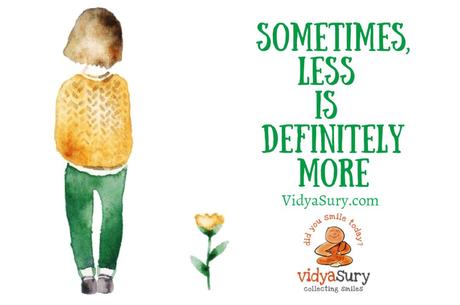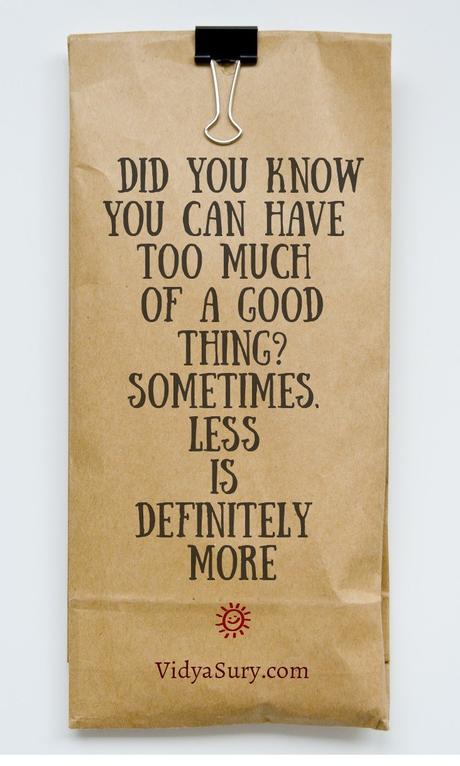
Did you know you can have too much of a good thing?
That less is more?
Of course, you do! We've all grown up hearing that bit of advice.
When you have too much of something, it is almost always bad.
Case in point: Arsenic, a naturally occurring chemical. It is commonly found in drinking water. In small amounts, it's harmless. In excessive amounts, it's deadly.
This is true for almost everything with which we come in contact. Also, there is nothing good in this life that doesn't come without a cost. And because there are fixed costs, there are also fixed limits to how much of it we can have.
One example is friendship. One might think that one can never have too many friends. But as it happens, one can. Have you heard of Robin Dunbar? He's the director of the Institute of Cognitive and Evolutionary Anthropology at Oxford University and his name is associated with the Dunbar number, which does not actually have a precise value.
The Dunbar number is the number of meaningful relationships one can have. It is estimated at around 150. And truly meaningful relationships top out at about 50, with much smaller inner-circles. Trying to have more friends than our social evolution can bear can result in having only shallow relationships rather than friends. You can really get more out of friendships by cutting back on the number of friends you have. I am sure most of you will attest to this, especially in today's world.
In this context, three things that recently highlighted the "less is more" concept are prescription drugs, health products and dietary supplements and, of all things, exercise.
First culprit: prescription drugs
Some believe that if one pill is good, two must be better. That is exactly the kind of thinking that leads to a messy downfall. Even if that downfall is not addiction, there are usually unpleasant side-effects to pharmaceuticals. It is ideal to always take prescriptions as prescribed by the doctor. But for best results, less medicine is almost always a better choice than more, as we recently discovered firsthand, in the most painful manner.
Over the last three weeks, a prescription drug created havoc. This wasn't even a case of excess, but because the doctor did not keep us informed about possible side-effects, it was taken for longer than it should have been and this led to some scary situations.
There is no denying that prescription drugs are quite literally lifesavers. The problem is when taken to excess, prescription drugs are also merciless killers. This applies to the legitimate prescription handed out by a doctor to treat a patient, and the non-legit stuff that some people manage to get hold of. In fact, prescription drug rehab centers exist because that fact is not immediately obvious to people who use the drugs.
Drugs don't always destroy lives all at once. Rather, they take life by the inch. For the user, it begins with a positive and desirable benefit. If they didn't, people wouldn't take them. But that benefit reaches a point of diminishing returns before it becomes harmful.
It is the same with health products and dietary supplements
Annoyingly available over the counter, health products, and dietary supplements are not always healthy. Today, the market is filled with glowing references for a variety of health products easily available off the shelf. As with most things, it largely depends on the person since we all have different body chemistry. Each one of us reacts to things differently. For instance, the amount of coconut oil it takes for one person to feel vibrant may cause another person diarrhea, stomach cramps, nausea, and breakouts. I remember how oats, supposed to be healthy, did not agree with my Mom at all.
There are also allergies to consider. Some people assume that because they bought it from a health food store, it is safe and will agree with them. But did you know, we can have allergies even to sunlight? So it is not wise to ignore possible allergies to herbs, oils, and other natural ingredients.
Even exercise!
Exercise is one area where self-improvers rarely practice restraint. They tend to work out to the extent of their physical limits, and then try to push those limits even further. Unfortunately, excessive exercise tends to lead to excessive pain. That pain in turn, can encourage prescription abuse.
At healthy levels, exercise is good. But beyond that, it is important to pause and think about why there's a tendency to take it to the extreme. Sometimes, it can be a sign of deeper issues that need to be sorted out. While some exercises are inherently dangerous and should only be attempted by professionals in peak condition, if there's pain in the joints and muscles, one can't exercise it away. It is far better to seek medical help or follow a physical therapist's instructions.
Why, when I joined the local gym (and quit after a year), I was specifically advised to stick to light exercise since I am diabetic. Doing the more strenuous stuff would have only caused me health issues.
I know someone who is a complete gym nut, overdoes things, and then, turns to prescription medication, and also goes to town on the health supplements. Such a vicious cycle. In fact, addiction recovery is often the trigger for excessive health supplements, which tends to precede a course of excessive exercise. The cycle continues and intensifies. Rinse, repeat, intensify...
So with every aspect of life, it is worthwhile to remember that too much of a good thing is a bad thing.
You know what they say: moderation is key.
Often, by cutting back, you can get more out of good things.


